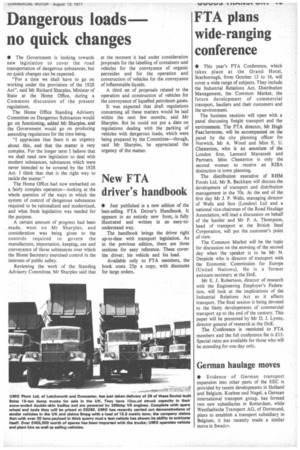Dangerous loads
Page 17

If you've noticed an error in this article please click here to report it so we can fix it.
no quick changes
• The Government is looking towards new legislation to cover the road transportation of dangerous substances, but no quick changes can be expected.
"For a time we shall have to go on working under the provisions of the 1928 Act", said Mr Richard Sharpies, Minister of State at the Home Office, during a Commons discussion of the present regulations.
The Home Office Standing Advisory Committee on Dangerous Substances would go on functioning, added Mr Sharpies, and the Government would go on producing amending regulations for the time being.
"I appreciate that there is an urgency about this, and that the matter is very complex. For the longer term I believe that we shall need new legislation to deal with modern substances, substances which were never intended to be covered by the 1928 Act. I think that that is the right way to tackle the matter.
The Home Office had now embarked on a fairly complex operation—looking at the whole question of the ways in which the system of control of dangerous substances required to be rationalized and modernized. and what fresh legislation was needed for the purpose.
A certain amount of progress had been made, went on Mr Sharpies, and consideration was being given to the controls required to govern the manufacture, importation, keeping, use and conveyance of those substances over which the Home Secretary exercised control in the interests of public safety.
Reviewing the work of the Standing Advisory Committee. Mr Sharpies said that at the moment it had under consideration proposals for the labelling of containers and vehicles for the conveyance of organic peroxides and for the operation and construction of vehicles for the conveyance of inflammable liquids.
A third set of proposals related to the operation and construction of vehicles for the conveyance of liquefied petroleum gases.
It was expected that draft regulations concerning all these matters would be laid within the next few months, said Mr Sharpies. But he could not put a date on regulations dealing with the parking of vehicles with dangerous loads, which were being prepared by the Committee—though, said Mr Sharpies, he appreciated the urgency of the matter,




















































































